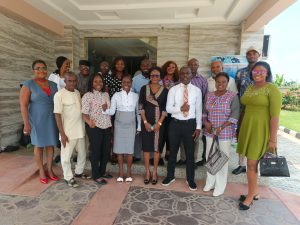11 States Leave Behind Akwa Ibom on Family Planning Funding, Spend Multimillion Naira on Procurement of Commodities

By Ekemini Simon
11 States of the Federation have implemented the State Funded Procurement Guidelines on family planning in 2024 to align with Nigeria’s FP2030 commitments, which aim to improve access to contraceptive services and empower women and couples to make informed reproductive health choices.
The Federal Ministry of Health, with support from the United Nations Population Fund (UNFPA), has developed national guidelines for state-funded procurement of family planning (FP) commodities, aiming to increase domestic resources and mobilize resources for last-mile distribution.
The guidelines encourage states to allocate a minimum of 1 percent of their annual health budgets to FP, equivalent to N4 billion.
The guidelines outline various procurement methods, including pooled procurement and international co-procurement models covering a range of FP commodities, including condoms, pills, injectables, and implants.
Finding show that the 11 States that have implemented the State Funded Procurement Guidelines in 2024 are Delta- N30 million, Osun- N30 million, Edo -N27 million, Rivers- N40 million, Adamawa – N22 million, Ondo- N20 million, Kaduna – N50 million, Gombe- N35 million, Lagos- N25 million, Sokoto N20 million, Ogun -N10 million.
Checks into the Akwa Ibom State successive year Financial Statements and Budget Implementation Reports show that Akwa Ibom State is yet to spend funds for the procurement of family planning commodities even as it has not also contributed to the national basket fund for family planning.
Finding also revealed that the State is not providing consumables needed to administer family planning commodities which are provided by the Federal Government. Some of these consumables include examination gloves, surgical gloves, Jik, povidone antiseptic, 2ml /5ml syringes, injection needle, cup plaster, elastoplast, gas/kg or Kerosene and Lidocaine injection.
Others are surgical blade, Cotton wool(500gm), Detergent (medium), Liquid soap, Serviette, Pad(Comfit), and Water for injection. The failure of the State government to provide these consumables to Health facilities have made patients bear the cost.
When contacted for insight into the challenge faced by the State in funding family planning and the plan of the State Government to address the gaps, the Akwa Ibom State Commissioner for Health, Dr. Ekem Emmanuel told TheMail Newspaper that he could only respond when he gets briefing on the issue by the ministry since he is new at the ministry. He promised to reach back to TheMail Newspaper after getting the briefing.
Future Funding hangs in the balance
Funding for family planning commodities comes from both domestic and external sources, with the Federal Government, states, and local governments playing critical roles, alongside contributions from international donors.
Analysis of documents show that in the last 12 years, external donors like the UNFPA, Foreign, Commonwealth and Development Office (FCDO), United States Agency for International Development (USAID), Bill and Melinda Gates Foundation (BMGF), and Global Affairs Canada have contributed significantly to family planning commodity procurement in Nigeria.
Their contributions often account for more than 70% of all funds used for family planning commodity procurement. USAID, one of the major funders, has currently halted all its fundings thus posing a significant challenge on the funding flow for procurement of commodities.
On the other hand, The Federal Government’s contributions have sometimes fallen short of the committed amounts, leading to a funding gap and the need for more domestic resource mobilization to ensure sustainable and predictable funding for family planning services.
The Challenge Initiative to the Rescue
The Challenge Initiative (TCI) has employed a co-financing strategy to support Akwa Ibom State in its family planning and reporting.
At the Akwa Ibom State Media Roundtable on Family planning held last week in Uyo, TCI said it has assisted the State in strengthening the Health system by coordinating Structures, ensuring Health Management Information System(HMIS) data quality and providing postpartum family planning.

The organisation said they have coordinated structures by ensuring the State Social Behavioural and Communication Committee (SBCC) Technical Working Group (TWG) led community advocacy meetings to community gatekeepers.
TCI said they have ensured State’s Advocacy Core Group (ACG) achieved full registration as a recognized organization with the Corporate Affairs Commission (CAC), ensured presence of an Active Interfaith Forum, and RH M&E Technical Working Group
On ensuring HMIS data quality, TCI said two rounds of FP Data Quality Assessment were conducted in 40 facilities using the E-DQA tool. They said as at the last round, facilities recorded an increased data quality performance from 75.2 percent to 77.0 percent.
The organisation said through the RH M&E Technical Working Group, TCI supported the state to reduce inaccurate reporting of sterilization data from 1725 in 2022 to 31 in 2024.
On postpartum Family planning services (PPFP), TCI said it has distributed PPFP job aids, integrated PPFP into other Maternal, Newborn, and Child Health (MNCH) services, tracked PPFP intenders an trained Postpartum Intrauterine Contraceptive Device (PPIUD) Providers.
TCI said in 2024, it had ensured 2637 social mobilization activities were conducted reaching 137,191 persons across 10 LGA, 64,093 persons referred for FP servicom while 49,059 (77%) people completed referral services in 40 facilities.
TCI also noted that it has supported 80 facilities with supervisory visits while 33 facilities visited are in optimal condition recorded above 80% using the checklist.
Other support TCI has provided include conducting 137 inreaches and providing FP services to 4,019 clients with TCI funding the inreaches, 100 mobile outreaches conducted in TCI LGAs with 6242 people receiving services, 75 Whole State orientation sessions conducted in supported facilities with over 1006 clinical and nonclinical staff oriented on FP. TCI said it had trained sex service providers to provide immediate PPFP and Long-acting reversible contraception, coupled with 40 service providers and 10 LGA M&E officers trained on MHIS data documentation and management.







